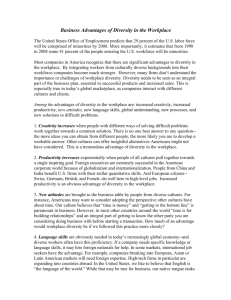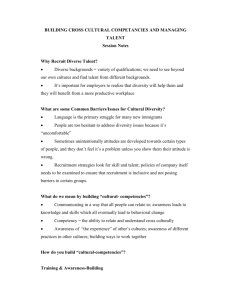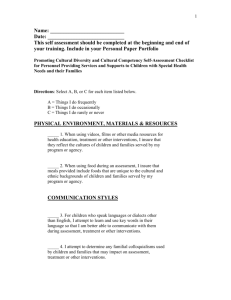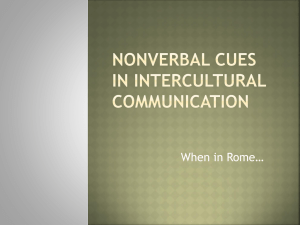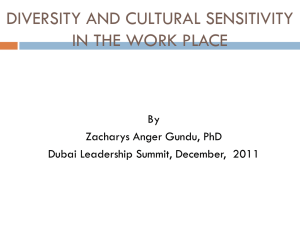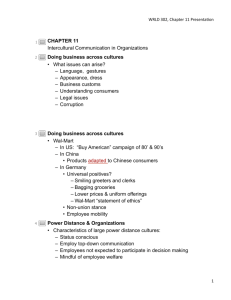CROSS CULTURE
advertisement
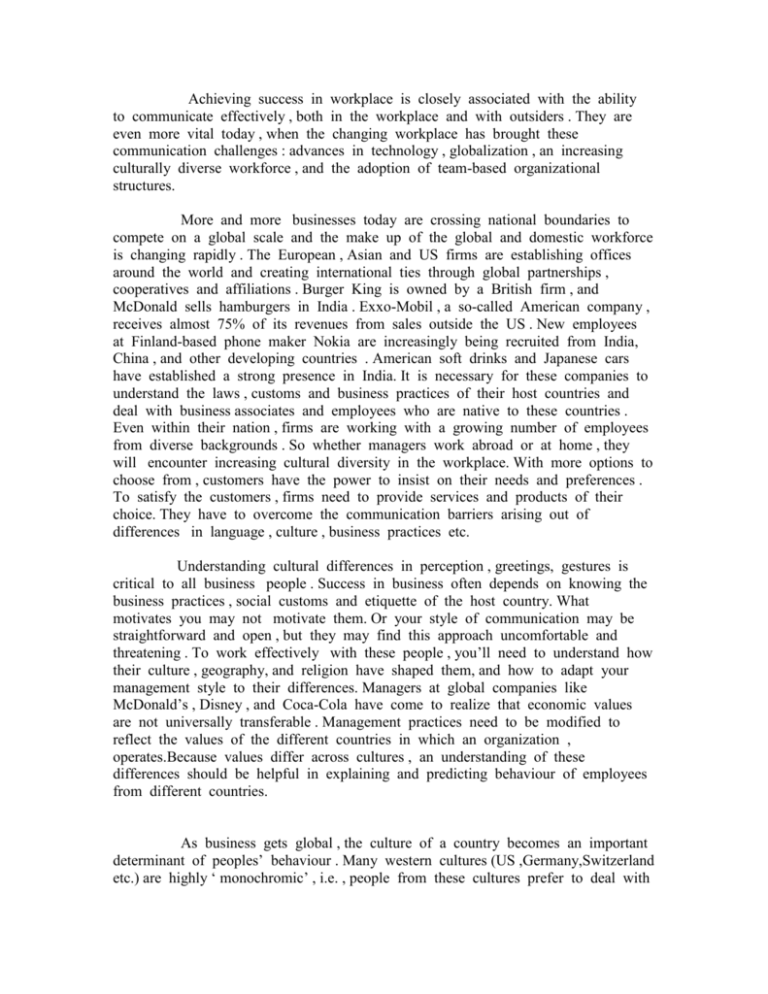
Achieving success in workplace is closely associated with the ability to communicate effectively , both in the workplace and with outsiders . They are even more vital today , when the changing workplace has brought these communication challenges : advances in technology , globalization , an increasing culturally diverse workforce , and the adoption of team-based organizational structures. More and more businesses today are crossing national boundaries to compete on a global scale and the make up of the global and domestic workforce is changing rapidly . The European , Asian and US firms are establishing offices around the world and creating international ties through global partnerships , cooperatives and affiliations . Burger King is owned by a British firm , and McDonald sells hamburgers in India . Exxo-Mobil , a so-called American company , receives almost 75% of its revenues from sales outside the US . New employees at Finland-based phone maker Nokia are increasingly being recruited from India, China , and other developing countries . American soft drinks and Japanese cars have established a strong presence in India. It is necessary for these companies to understand the laws , customs and business practices of their host countries and deal with business associates and employees who are native to these countries . Even within their nation , firms are working with a growing number of employees from diverse backgrounds . So whether managers work abroad or at home , they will encounter increasing cultural diversity in the workplace. With more options to choose from , customers have the power to insist on their needs and preferences . To satisfy the customers , firms need to provide services and products of their choice. They have to overcome the communication barriers arising out of differences in language , culture , business practices etc. Understanding cultural differences in perception , greetings, gestures is critical to all business people . Success in business often depends on knowing the business practices , social customs and etiquette of the host country. What motivates you may not motivate them. Or your style of communication may be straightforward and open , but they may find this approach uncomfortable and threatening . To work effectively with these people , you’ll need to understand how their culture , geography, and religion have shaped them, and how to adapt your management style to their differences. Managers at global companies like McDonald’s , Disney , and Coca-Cola have come to realize that economic values are not universally transferable . Management practices need to be modified to reflect the values of the different countries in which an organization , operates.Because values differ across cultures , an understanding of these differences should be helpful in explaining and predicting behaviour of employees from different countries. As business gets global , the culture of a country becomes an important determinant of peoples’ behaviour . Many western cultures (US ,Germany,Switzerland etc.) are highly ‘ monochromic’ , i.e. , people from these cultures prefer to deal with one task at a time. So it is quite normal that a German would plan out every activity in a step by step manner while many Latin and Asian countries (eg: India,Brazil,Spain,Arab Countries etc.) have a ‘ polychromic ‘ orientation –they deal with more than one activity at the same time , it would not be unusual for an Italian to interrupt a meeting to make a personal call. In more individualistic countries (eg: US ,Australia,U.K. etc.) it is culturally acceptable to speak one’s mind and express disagreements. Contrary to this , a person from a collective culture (eg: Mexico,Indonesia, Japan,China etc.) may find such expressions to be discourteous and even aggressive.In collective cultures disagreements are expressed in a more subtle manner which may appear as dishonest and lacking in trustworthiness to a person from individualistic culture. One finds the cultural values of individualism and entrepreneurship embodied in the American venture capitalist system. In many US companies , variable pay and compensation are tied to the company’s share prices which would be culturally unacceptable in countries such as Germany or Japan. At a macro level , cultural values allow certain businesses to flourish while not providing the right climate for others. The French culture is known for its emphasis on elegance, elitism , and concern regarding form. Mexican culture is known for its pro-death values.The Life Insurance industry is not a flourishing business in Mexico. The cultural values of the society define the meaning and reason of a business, and how it is organized. In many Arab and Latin countries the business firm is seen as an extension of family , and family honor comes before profits .In France , business firms are culturally seen as social institutions that uphold national pride. Such cultural differences have a direct impact on the strategic orientation of companies across cultures . While US companies emphasized more on the profits , dividends , and stock prices , Japanese companies focused more on new product development and market share. Cultural values also influence how a business is organized and conducted in a particular society . In collective societies (China,Saudi Arab,Spain ) personal contacts play an important role. The ‘guanxi’(interpersonal relationships) system in China , encourages people to conduct business based on personal relationships. This is in sharp contrast to more individualistic societies where personal relationships are deliberately kept away from professional relationships . The Japanese follow the tradition of ‘ keiretsu’ which reflects the Japanese values of collectivism and interdependence. In many hierarchial cultures , the meaning and value of job lies in its status , rather than in the pay packet. In these cultures , they expect to be recognized for their seniority. In many European and Scandinavian countries work is seen as just another part of life but in US and Japan , work is an essential part of one’s personal identity. Arabs don’t make decisions the same way that Canadians do .Managers in Egypt will make decisions at a much slower pace than their American counterparts. Decision making by Japanese managers is much more group-oriented than in US. When communicating with people from a different culture , one can begin by trying to assess the cultural context . One should assume differences until similarity is proven. Delay judgement until one has had sufficient time to observe and interpret the situation from the differing perspectives of all the cultures involved. Before sending a message , put oneself in the recipient’s shoes. What are his or her values,experiences, and frames of reference . Try to see the other person as he or she really is. Treat one’s interpretation concerned with someone from a foreign culture as a hypothesis that needs further testing rather than as a certainty . One can assess the feedback provided by recipients to see if it confirms the hypothesis. For important decisions one can check with other foreign and homecountry colleagues to make sure that one’s interpretations are on target. As aspiring managers we should build in enough flexibility for future growth and adaptation.The real world is turbulent ,requiring organizations and their members to undergo dynamic change if they are to perform at competitive levels.Managers should be the primary change agents in an organization .By learning to make communication culture specific we will be able to reach out to the targeted groups more effectively and to study the influence of the social classes and social stratification of that country , on the customer characteristics and behaviour, understand the role of reference groups, gauge the effect of cultural values on the customers and identify the opinion leaders and assess their influence in order to plan the strategies and programme the action better. Reference: 1. Organizational Behaviour - Stephen . P.Robbins & Seema Sanghi 2. Business Communication Today – Bovee 3. Business Communication - Meenakshi Raman




